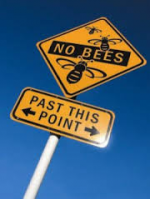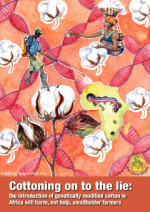Articles
19.06.2015 | permalink
Deconstructing Indian cotton: weather, yields, and suicides
Research
Deconstructing Indian cotton: weather, yields, and suicides
Andrew Paul Gutierrez, Luigi Ponti, Hans R Herren, Johann Baumgärtner and Peter E Kenmore
Environmental Sciences Europe 2015, 27:12 doi:10.1186/s12302-015-0043-8
Published: 17 June 2015
(.....)
Conclusions
Bt cotton may be economic in irrigated cotton, whereas costs of Bt seed and insecticide increase the risk of farmer bankruptcy in low-yield rainfed cotton. Inability to use saved seed and inadequate agronomic information trap cotton farmers on biotechnology and insecticide treadmills. Annual suicide rates in rainfed areas are inversely related to farm size and yield, and directly related to increases in Bt cotton adoption (i.e., costs). High-density short-season cottons could increase yields and reduce input costs in irrigated and rainfed cotton. Policy makers need holistic analysis before new technologies are implemented in agricultural development.
19.06.2015 | permalink
German beekeepers call for GMO cultivation ban

German beekeepers have called for a nationwide ban on cultivating GM plants, reports the German NGO keine-gentechnik.de.
The call by the German Beekeepers Association (DIB), which represents almost 100,000 beekeepers, comes after Europe adopted controversial legislation enabling member states to opt-out of the cultivation of GMOs that have been approved at the EU level.
Under the law, a member state can ban a GMO in part or all of its territory. But the law has come under heavy criticism for failing to provide a solid basis for such bans.
The beekeepers are urging Agriculture Minister Christian Schmidt (CSU) to implement a Germany-wide ban on cultivation. The Minister pleads, however, for letting each state decide individually.
The beekeepers counter that a piecemeal approach will not work. Bees fly up to eight kilometres in search of food, the DIB said, so a juxtaposition of GM crop cultivation zones and GMO-free zones within Germany would be "environmentally and agriculturally unacceptable".
“Bees know no borders," the DIB added.
18.06.2015 | permalink
Using 100% non-GMO corn in whiskeys
The Non-GMO Corn Movement In Kentucky Bourbon
One of the driving forces behind the bourbon boom is the drive toward authenticity. The farm-to-fork movement has moved into spirits, and consumers want something that was produced by human hands with grains grown near the distillery. Maker’s Mark still uses grains produced in their county, and most Kentucky bourbon distilleries go out of their way to purchase grains grown within our state.
That said, there just aren’t enough grains grown in the entire state to support the bourbon industry, so they often have to get grains from other states to fulfill demand. But there are at least three distilleries that I’ve found that use 100% non-GMO corn in their various whiskeys: Wild Turkey, Four Roses, and Buffalo Trace.
17.06.2015 | permalink
EU Health & Food Safety Commissioner Vytenis Andriukaitis: EU must decide GMO stance at national level
The deadlock around genetically modified organisms (GMOs) needs to end, according to EU Health and Food Safety Commissioner Vytenis Andriukaitis.
The Commissioner said that he wasn’t surprised that the European Parliament Environment Committee recently rejected the GMO opt-out clause, which would allow individual Member States to impose national bans on GMOs.
“I was prepared for such a reaction. At committee level we have very interesting discussions and questions from different angles.”
However, he said that Member States must take a clear position on GM and not hide behind Europe and blame Europe.
16.06.2015 | permalink
Māori: Iwi fight to stay GMO free
Iwi in Tai Tokerau are fighting to keep their rohe free of Genetically Modified Organisms.
Tai Tokerau and environmental groups supported Whangarei District Council in successfully defending the right of local authorities to manage the use of Genetically Modified Organisms.
Federated Farmers took a test case to the Environment Court arguing Northland Regional Council had acted outside the law in taking that view managing their use. The farming lobby group lost and is now appealing that decision in the High Court.
Representative for Ngāti Hau, Benjamin Pittman, said they were "standing up for what they believe", because tikanga Māori held strict divisions between human and non-human things, and those to do with the body and food.
16.06.2015 | permalink
Are we crossing the tipping point with GMOs?
US food brands rush to go Non-GMO
GMWatch
Are we crossing the tipping point with GMOs?
The US packaged food company Diamond Foods Inc is moving its US sales to Non-GMO Project Verified in response to consumer demand.
ETB North America, LLC, one of the fastest growing sports nutrition companies in the US and the makers of Eat The Bear protein, has announced that it has reformulated its flagship whey protein isolate using non-GMO isolate.
And Hellmann's Mayonnaise Dressing with Olive Oil is now made with Non-GMO ingredients.
It seems that many American mothers want Quaker to follow suit. A recent survey for the Just Label It campaign found that nearly 93% of moms who buy Quaker products want the company to label foods that contain GMOs. The survey also found that of 800 mothers surveyed online, 80% want the company to stop financing anti-GMO labelling efforts.
16.06.2015 | permalink
Ghana GMO Case: VEGGHANA & Farmers’ Group Join Plaintiffs
Press Release: 16 June, 2015, by Food Sovereignty Ghana
The Human Rights division of the High Court in Accra today heard the case in which Food Sovereignty Ghana (FSG) is suing for an interim injunction on the commercial release of Bt cowpea and genetically modified (GM) rice in Ghana.
Today Judge Kofi Essel Mensah for the sake of time abridged the application for joinder by the Kanyan Akuafuo Kuo (KAK) from the Brong Ahafo region which was scheduled to be heard on June 16th 2015 and moved the date to the 15th June as all parties to the case were all present in court and already represented by counsel. He also granted the request for joinder by the Vegetarian Association of Ghana (VegGhana) to join the case as plaintiffs against the commercialization and development of GMO in Ghana. He cited a common position held by Vegetarians concerning the integrity of their food sources especially when some GM crops include the incorporation of animal genes as a relevant concern on their part.
15.06.2015 | permalink
German DIY shops stop selling weedkiller Roundup
Monsanto: German companies stop glyphosate sales
Deutsche Wirtschafts Nachrichten (German Economic News)
According to Swiss supermarkets, German companies have announced halting sales of Monsanto’s glyphosate herbicide. In 1971, Monsanto patented glyphosate. Today its glyphosate (“Roundup”) constitutes two billion US dollars in annual sales.
(.....)
The registration of glyphosate is currently being re-examined by the EU, because the current authorization of the active ingredient ends in December 2015.
15.06.2015 | permalink
France has announced a ban on over the counter sales of weedkiller Roundup
Roundup weedkiller banned from French garden centres over 'probable' link to cancer
The French Ecology Minister said: 'France must be on the offensive with regards to the banning of pesticides'
Monday 15 June 2015
France has announced a ban on over the counter sales of a brand of weedkiller from garden centres after the active ingredient was classified as "probably carcinogenic to humans" by the UN.
The UN’s International Agency for Research on Cancer (IARC) classified glyphosate in March as "probably carcinogenic to humans", and is the active ingredient in Roundup.
The weedkiller is used by amateur gardeners as well as farmers and is the foremost product of American biotechnology giant Mosanto.
French Ecology Minister Segolene Royal told France 3 television on Sunday: "France must be on the offensive with regards to the banning of pesticides."
- The Independent: Roundup weedkiller banned from French garden centres over 'probable' link to cancer
- Reuters: French minister asks shops to stop selling Monsanto Roundup weedkiller
- IBT Media Inc: Segolene Royal Calls For French Ban On Monsanto's Roundup Herbicide
- Consumer Association CLCV: Glyphosate: a "probable carcinogen" herbicide
12.06.2015 | permalink
Cottoning onto the lie: GM cotton will harm not help small farmers in Africa

After 5 seasons of genetically modified (GM) cotton cultivation in Burkina Faso farmers are denouncing their contracts with Monsanto and cotton stakeholders are discussing compensation for losses incurred since 2008 due to low yields and low quality fibre. Many other African governments are poised to follow suit but should note how GM cotton has impoverished smallholders in South Africa and Burkina Faso as well as heed the fierce opposition on the continent toward accepting it.
- African Centre for Biodiversity: Cottoning onto the lie: GM cotton will harm not help small farmers in Africa
- African Centre for Biodiversity: Cottoning on to the lie: The introduction of genetically modified cotton in Africa will harm, not help, smallholder farmers
- GMO-FREE EUROPE: African agriculture under threat: GM crops in the wider context
